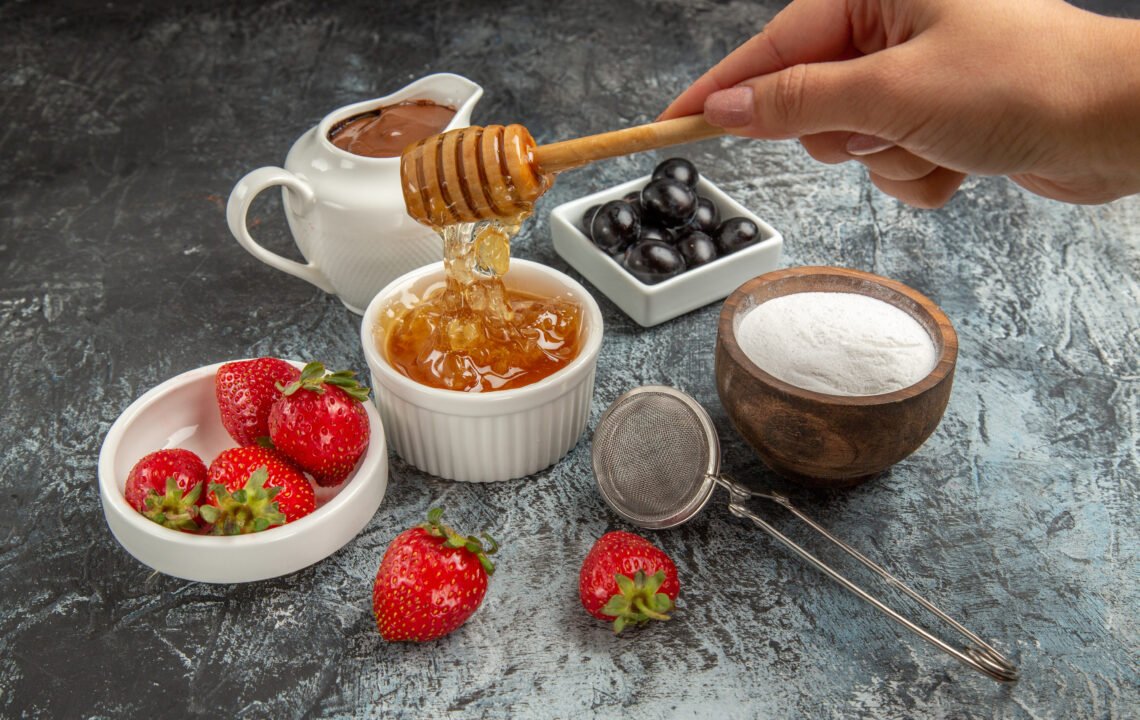When people fast for health or to lose weight, they often wonder if they can have things like honey and still be fasting. Honey is sweet and comes from nature, and it’s known for being healthy.
But when you’re fasting, even a little bit of honey, which has about 64 calories in one tablespoon, can stop your fast. This is because your body starts to use the sugar from the honey for energy, instead of using stored fat.
So, if you’re trying not to eat or drink anything with calories during your fast, it’s important to know that even honey can break your fast.
This article will help you understand more about fasting and how honey fits into the picture, especially for those trying to get the most out of their fasting time.
But when you’re fasting, even a little bit of honey, which has about 64 calories in one tablespoon, can stop your fast. This is because your body starts to use the sugar from the honey for energy, instead of using stored fat.
So, if you’re trying not to eat or drink anything with calories during your fast, it’s important to know that even honey can break your fast.
This article will help you understand more about fasting and how honey fits into the picture, especially for those trying to get the most out of their fasting time.
Does Honey Break a Fast?
Yes, consuming honey does indeed break a fast. This is because fasting involves refraining from all caloric intake for a set duration, aiming to trigger certain metabolic and physiological benefits. Honey, despite its natural origin and health benefits, is a source of sugar and calories, containing approximately 64 calories and 17 grams of carbohydrates per tablespoon. When you eat or drink anything that contains calories, your body shifts from fasting mode to digestive mode.
This change happens because when you eat honey, your body has to break down the sugars in it, which makes your blood sugar levels go up. When this happens, your body releases insulin, a hormone that helps your cells use this sugar for energy or store it for later. This whole process tells your body that you’re not fasting anymore because it’s busy digesting and using the energy from the food.
If you’re fasting for health, like to lose weight, control blood sugar, or clean out damaged cells in your body, it’s very important to not consume any calories during your fast. Even a little bit of calories can stop these health benefits from happening. This means you should avoid eating things like honey if you want to keep your body in a true fasting state.
This change happens because when you eat honey, your body has to break down the sugars in it, which makes your blood sugar levels go up. When this happens, your body releases insulin, a hormone that helps your cells use this sugar for energy or store it for later. This whole process tells your body that you’re not fasting anymore because it’s busy digesting and using the energy from the food.
If you’re fasting for health, like to lose weight, control blood sugar, or clean out damaged cells in your body, it’s very important to not consume any calories during your fast. Even a little bit of calories can stop these health benefits from happening. This means you should avoid eating things like honey if you want to keep your body in a true fasting state.
Health Benefit of Taking Honey
Honey, a natural sweetener produced by bees, has been valued for its medicinal properties for thousands of years. Here are some of the key health benefits associated with consuming honey:
Rich in Antioxidants: Honey contains antioxidants, including phenolic compounds like flavonoids. Antioxidants help to protect your body from cell damage due to free radicals. Free radicals contribute to the aging process and may also play a role in the development of chronic diseases such as cancer and heart disease.
Antibacterial and Antifungal Properties: Honey has natural antibacterial and antifungal effects thanks to its components, including hydrogen peroxide. This makes honey effective in treating wounds and promoting healing.
Rich in Antioxidants: Honey contains antioxidants, including phenolic compounds like flavonoids. Antioxidants help to protect your body from cell damage due to free radicals. Free radicals contribute to the aging process and may also play a role in the development of chronic diseases such as cancer and heart disease.
Antibacterial and Antifungal Properties: Honey has natural antibacterial and antifungal effects thanks to its components, including hydrogen peroxide. This makes honey effective in treating wounds and promoting healing.
Helps with Digestive Issues: Honey is often used to treat digestive issues such as diarrhea, though more research is needed. It is also potent in treating Helicobacter pylori (H. pylori) bacteria, a common cause of stomach ulcers.
Soothes a Sore Throat: Honey is an old sore throat remedy. It not only soothes the throat but also can reduce cough symptoms. This is particularly helpful in providing a better night’s sleep when sick.
Nutritious: Though honey is high in sugar, it also contains small amounts of vitamins and minerals like vitamin C, calcium, and iron. The exact nutrition content varies depending on the environment and flowers from which the honey is harvested.
Soothes a Sore Throat: Honey is an old sore throat remedy. It not only soothes the throat but also can reduce cough symptoms. This is particularly helpful in providing a better night’s sleep when sick.
Nutritious: Though honey is high in sugar, it also contains small amounts of vitamins and minerals like vitamin C, calcium, and iron. The exact nutrition content varies depending on the environment and flowers from which the honey is harvested.

Phytonutrient Powerhouse: Honey’s phytonutrients are responsible for its antioxidant properties, as well as its antibacterial and antifungal power. They’re also thought to be the reason raw honey has shown immune-boosting and anticancer benefits. Processing and pasteurization can reduce these benefits.
Helps with Wound Healing: When applied to the skin, honey can be a potent wound healer. Its antibacterial properties prevent infection, and its wound-healing properties are so effective that Manuka honey is FDA-approved for use in treating wounds.
Improves Cholesterol Levels: Honey may improve cholesterol levels by reducing total and LDL (bad) cholesterol while significantly raising HDL (good) cholesterol. This can lead to reduced risk factors for heart disease.
Can Lower Triglycerides: Elevated triglycerides are a risk factor for heart disease and type 2 diabetes. Some studies show that honey can lower triglyceride levels, especially when used as a sugar substitute.
Better for Diabetics than Refined Sugar: While honey can raise blood sugar levels, it’s not as rapidly as refined sugars. However, it should still be consumed with caution by individuals with diabetes.
Helps with Wound Healing: When applied to the skin, honey can be a potent wound healer. Its antibacterial properties prevent infection, and its wound-healing properties are so effective that Manuka honey is FDA-approved for use in treating wounds.
Improves Cholesterol Levels: Honey may improve cholesterol levels by reducing total and LDL (bad) cholesterol while significantly raising HDL (good) cholesterol. This can lead to reduced risk factors for heart disease.
Can Lower Triglycerides: Elevated triglycerides are a risk factor for heart disease and type 2 diabetes. Some studies show that honey can lower triglyceride levels, especially when used as a sugar substitute.
Better for Diabetics than Refined Sugar: While honey can raise blood sugar levels, it’s not as rapidly as refined sugars. However, it should still be consumed with caution by individuals with diabetes.
Does Honey Have Any Health Risks?
While honey is a natural sweetener with numerous health benefits, it also carries some potential health risks, especially when consumed in excess or by certain groups of people:
High in Calories and Sugar: Honey is rich in natural sugars and calories. Just one tablespoon of honey contains about 64 calories and 17 grams of sugar. Consuming too much honey can contribute to weight gain and increase the risk of developing conditions related to obesity, such as type 2 diabetes and heart disease.
Not Suitable for Infants: Honey should not be given to children under one year old due to the risk of botulism, a serious illness caused by the Clostridium botulinum spores found in soil and dust that can contaminate honey. Infants’ digestive systems are not mature enough to destroy these spores, leading to botulism, which can be life-threatening.
Allergic Reactions: Some people may be allergic to honey or components in honey, such as pollen. Allergic reactions can range from mild symptoms, such as hives or a runny nose, to severe, including anaphylaxis, a life-threatening condition that requires immediate medical attention.
Blood Sugar Impact: Despite its natural origin, honey is a source of sugars and can have a similar effect on blood sugar levels as other types of sugar, especially in people with diabetes. It can raise blood sugar levels, so individuals with diabetes should consume it with caution and under medical guidance.
Potential for Contamination: Raw honey, which is honey that hasn’t been pasteurized or filtered, may contain traces of toxins from plants or bacteria and fungi spores. While rare, this can lead to adverse effects in some people, particularly those with weakened immune systems.
Dental Health: Similar to other sweeteners, honey can contribute to tooth decay and cavities if dental hygiene is not adequately maintained. The sugar in honey can interact with bacteria in the mouth to produce acids that harm the enamel of the teeth.
High in Calories and Sugar: Honey is rich in natural sugars and calories. Just one tablespoon of honey contains about 64 calories and 17 grams of sugar. Consuming too much honey can contribute to weight gain and increase the risk of developing conditions related to obesity, such as type 2 diabetes and heart disease.
Not Suitable for Infants: Honey should not be given to children under one year old due to the risk of botulism, a serious illness caused by the Clostridium botulinum spores found in soil and dust that can contaminate honey. Infants’ digestive systems are not mature enough to destroy these spores, leading to botulism, which can be life-threatening.
Allergic Reactions: Some people may be allergic to honey or components in honey, such as pollen. Allergic reactions can range from mild symptoms, such as hives or a runny nose, to severe, including anaphylaxis, a life-threatening condition that requires immediate medical attention.
Blood Sugar Impact: Despite its natural origin, honey is a source of sugars and can have a similar effect on blood sugar levels as other types of sugar, especially in people with diabetes. It can raise blood sugar levels, so individuals with diabetes should consume it with caution and under medical guidance.
Potential for Contamination: Raw honey, which is honey that hasn’t been pasteurized or filtered, may contain traces of toxins from plants or bacteria and fungi spores. While rare, this can lead to adverse effects in some people, particularly those with weakened immune systems.
Dental Health: Similar to other sweeteners, honey can contribute to tooth decay and cavities if dental hygiene is not adequately maintained. The sugar in honey can interact with bacteria in the mouth to produce acids that harm the enamel of the teeth.
Conclusion: Can I Take Honey During Intermittent Fasting?
Honey, a natural sweetener full of health benefits, from antioxidants to wound healing, has been cherished for millennia. Yet, when it comes to fasting, especially intermittent fasting aimed at health improvement or weight loss, honey presents a paradox. Despite its healthful properties, consuming honey breaks a fast. This is due to its caloric content—about 64 calories per tablespoon, primarily from sugars, which shifts the body from a fasting to a digestive state, thereby interrupting fasting benefits like autophagy and insulin sensitivity.
For those dedicated to fasting’s strict calorie-free period, even the smallest amount of honey can disrupt the intended physiological processes. This doesn’t diminish honey’s value as a nutrient-rich, antioxidant-packed food beneficial for various health aspects, from enhancing digestive health to boosting immunity. However, moderation is key, as excessive consumption carries risks, including weight gain and elevated blood sugar levels. Therefore, while honey can be a valuable part of a balanced diet, its place during a fasting period is clear—it should be saved for times of eating to preserve the fast’s integrity and ensure maximum benefit.
For those dedicated to fasting’s strict calorie-free period, even the smallest amount of honey can disrupt the intended physiological processes. This doesn’t diminish honey’s value as a nutrient-rich, antioxidant-packed food beneficial for various health aspects, from enhancing digestive health to boosting immunity. However, moderation is key, as excessive consumption carries risks, including weight gain and elevated blood sugar levels. Therefore, while honey can be a valuable part of a balanced diet, its place during a fasting period is clear—it should be saved for times of eating to preserve the fast’s integrity and ensure maximum benefit.





